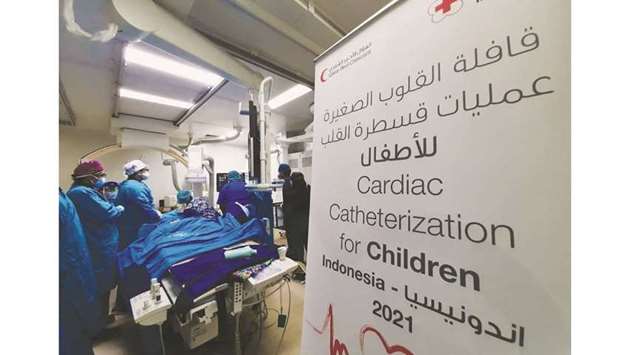Qatar Red Crescent Society (QRCS) has launched a ‘Little Hearts’ project in Indonesia, aimed at treating 40 children with congenital heart defects.
Hosted by the Harapan Kita National Heart Centre in Jakarta, the $90,000 project is co-implemented by QRCS, the Indonesian Red Cross Society, and Indonesia’s Ministry of Health (MoH). The procedures are performed by local medical specialists in cardiac catheterisation for children.
The launching ceremony was attended by MoH Health Service general-director Dr Azhar Jaya, Indonesian Red Cross Society secretary-general Sudirman Said, Harapan Kita National Heart Centre director Dr Iwan Dakota, and the doctors involved in the project.
In his speech, Dr Dakota thanked QRCS for its the humanitarian initiative of covering the costs of 40 cardiac catheterisations for children born with heart problems, a main cause of child mortality in Indonesia.
He described the initiative as a timely and long-awaited relief for the beneficiaries, whose families could not afford the costs of procedures. “I wish that this will not be the last one,” said Dr Dakota. “We still have a waiting list of 300 children who need help”.
Said stated: “I appreciate QRCS’ important role in Indonesia by supporting the response and recovery efforts in the aftermath of the 2018 and 2019 earthquakes in Sulawesi and Lombok, respectively. Now, they are acting to support the cardiac catheterisations for children. We hope that such a partnership with QRCS will continue to create opportunities of a better life for those who had ailing hearts since their birth”.
Dr Jaya welcomed the project, under which QRCS would help 40 children who have been looking for treatment. He called for further co-operation in the future to cover the remaining children on the cardiac catheterisation waiting list, as well as other medical specialties.
Being the first Little Hearts project to be executed in Indonesia, it is part of the Medical Convoys programme, which involves providing treatment for poor patients, performing surgeries in many medical specialisations, supplying the host hospitals with surgical equipment and consumables, and training medical professionals in the latest medical advancements.

Local medical specialists in cardiac catheterisation for children performed the procedures.
